Nursing Assignment: Political Activity, EBM, and Leadership Styles
VerifiedAdded on 2021/04/21
|5
|1107
|54
Homework Assignment
AI Summary
This nursing assignment addresses the importance of nurses' political involvement, emphasizing its role in developing leadership skills and advocating for patient safety. It argues that political activity allows nurses to influence policy, address ethical challenges, and improve patient outcomes. The assignment also discusses the significance of evidence-based medicine (EBM) in standardizing healthcare, ensuring high-quality patient care, and integrating research with clinical experience. Furthermore, it analyzes a student's leadership style, identifying it as diplomatic, characterized by building relationships and fostering team harmony. The assignment contrasts this with an autocratic leadership approach and includes references to support the arguments made.
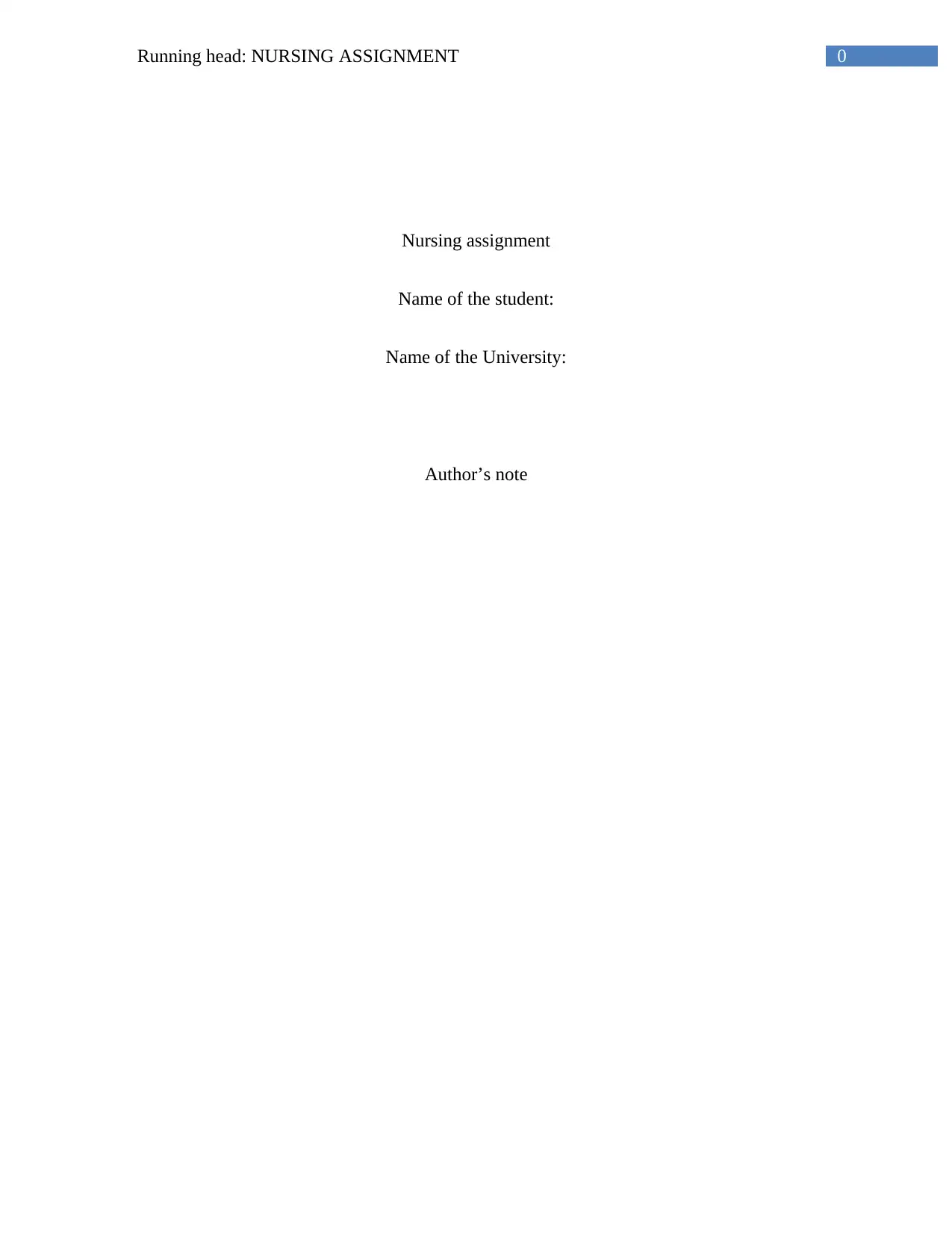
0Running head: NURSING ASSIGNMENT
Nursing assignment
Name of the student:
Name of the University:
Author’s note
Nursing assignment
Name of the student:
Name of the University:
Author’s note
Paraphrase This Document
Need a fresh take? Get an instant paraphrase of this document with our AI Paraphraser
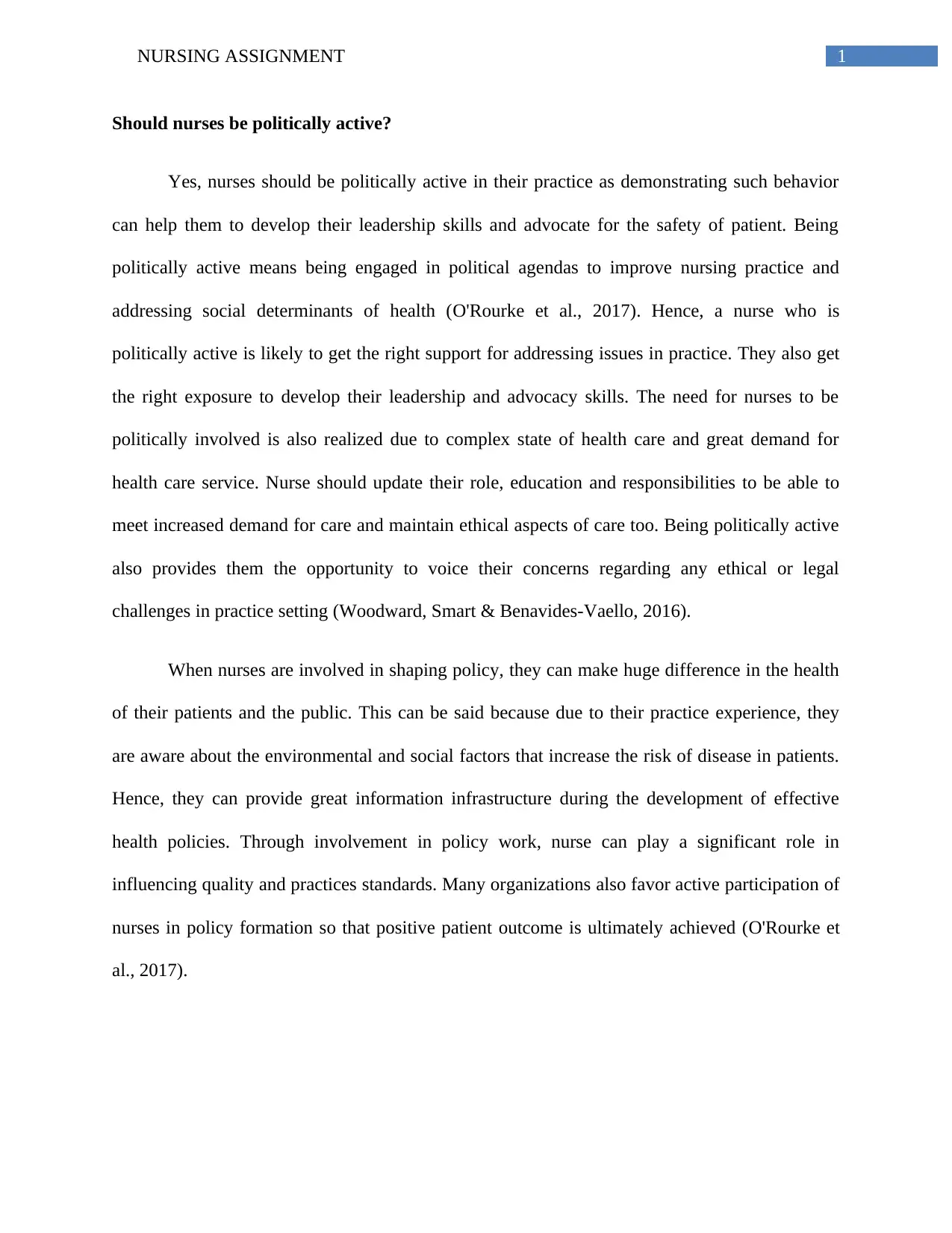
1NURSING ASSIGNMENT
Should nurses be politically active?
Yes, nurses should be politically active in their practice as demonstrating such behavior
can help them to develop their leadership skills and advocate for the safety of patient. Being
politically active means being engaged in political agendas to improve nursing practice and
addressing social determinants of health (O'Rourke et al., 2017). Hence, a nurse who is
politically active is likely to get the right support for addressing issues in practice. They also get
the right exposure to develop their leadership and advocacy skills. The need for nurses to be
politically involved is also realized due to complex state of health care and great demand for
health care service. Nurse should update their role, education and responsibilities to be able to
meet increased demand for care and maintain ethical aspects of care too. Being politically active
also provides them the opportunity to voice their concerns regarding any ethical or legal
challenges in practice setting (Woodward, Smart & Benavides-Vaello, 2016).
When nurses are involved in shaping policy, they can make huge difference in the health
of their patients and the public. This can be said because due to their practice experience, they
are aware about the environmental and social factors that increase the risk of disease in patients.
Hence, they can provide great information infrastructure during the development of effective
health policies. Through involvement in policy work, nurse can play a significant role in
influencing quality and practices standards. Many organizations also favor active participation of
nurses in policy formation so that positive patient outcome is ultimately achieved (O'Rourke et
al., 2017).
Should nurses be politically active?
Yes, nurses should be politically active in their practice as demonstrating such behavior
can help them to develop their leadership skills and advocate for the safety of patient. Being
politically active means being engaged in political agendas to improve nursing practice and
addressing social determinants of health (O'Rourke et al., 2017). Hence, a nurse who is
politically active is likely to get the right support for addressing issues in practice. They also get
the right exposure to develop their leadership and advocacy skills. The need for nurses to be
politically involved is also realized due to complex state of health care and great demand for
health care service. Nurse should update their role, education and responsibilities to be able to
meet increased demand for care and maintain ethical aspects of care too. Being politically active
also provides them the opportunity to voice their concerns regarding any ethical or legal
challenges in practice setting (Woodward, Smart & Benavides-Vaello, 2016).
When nurses are involved in shaping policy, they can make huge difference in the health
of their patients and the public. This can be said because due to their practice experience, they
are aware about the environmental and social factors that increase the risk of disease in patients.
Hence, they can provide great information infrastructure during the development of effective
health policies. Through involvement in policy work, nurse can play a significant role in
influencing quality and practices standards. Many organizations also favor active participation of
nurses in policy formation so that positive patient outcome is ultimately achieved (O'Rourke et
al., 2017).
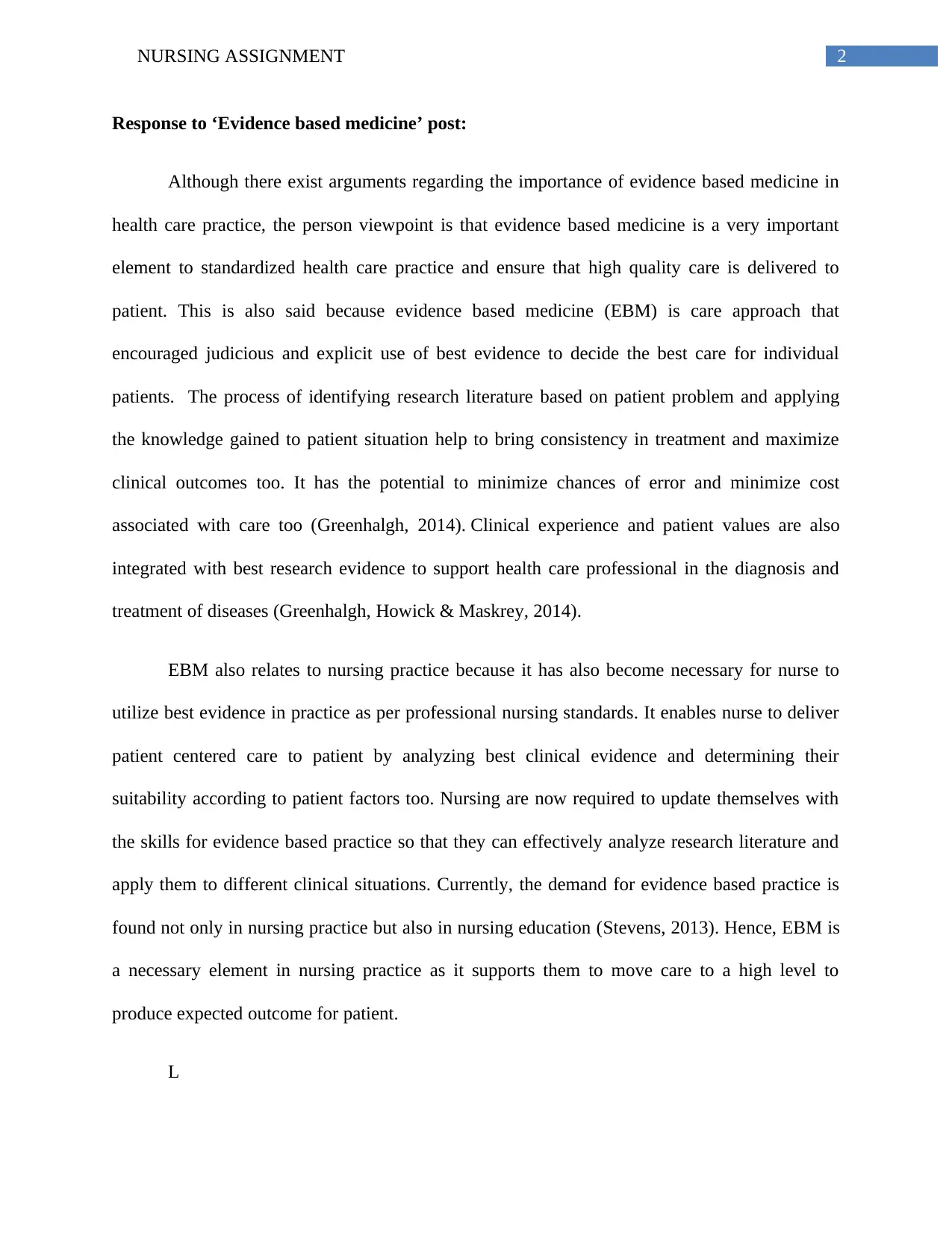
2NURSING ASSIGNMENT
Response to ‘Evidence based medicine’ post:
Although there exist arguments regarding the importance of evidence based medicine in
health care practice, the person viewpoint is that evidence based medicine is a very important
element to standardized health care practice and ensure that high quality care is delivered to
patient. This is also said because evidence based medicine (EBM) is care approach that
encouraged judicious and explicit use of best evidence to decide the best care for individual
patients. The process of identifying research literature based on patient problem and applying
the knowledge gained to patient situation help to bring consistency in treatment and maximize
clinical outcomes too. It has the potential to minimize chances of error and minimize cost
associated with care too (Greenhalgh, 2014). Clinical experience and patient values are also
integrated with best research evidence to support health care professional in the diagnosis and
treatment of diseases (Greenhalgh, Howick & Maskrey, 2014).
EBM also relates to nursing practice because it has also become necessary for nurse to
utilize best evidence in practice as per professional nursing standards. It enables nurse to deliver
patient centered care to patient by analyzing best clinical evidence and determining their
suitability according to patient factors too. Nursing are now required to update themselves with
the skills for evidence based practice so that they can effectively analyze research literature and
apply them to different clinical situations. Currently, the demand for evidence based practice is
found not only in nursing practice but also in nursing education (Stevens, 2013). Hence, EBM is
a necessary element in nursing practice as it supports them to move care to a high level to
produce expected outcome for patient.
L
Response to ‘Evidence based medicine’ post:
Although there exist arguments regarding the importance of evidence based medicine in
health care practice, the person viewpoint is that evidence based medicine is a very important
element to standardized health care practice and ensure that high quality care is delivered to
patient. This is also said because evidence based medicine (EBM) is care approach that
encouraged judicious and explicit use of best evidence to decide the best care for individual
patients. The process of identifying research literature based on patient problem and applying
the knowledge gained to patient situation help to bring consistency in treatment and maximize
clinical outcomes too. It has the potential to minimize chances of error and minimize cost
associated with care too (Greenhalgh, 2014). Clinical experience and patient values are also
integrated with best research evidence to support health care professional in the diagnosis and
treatment of diseases (Greenhalgh, Howick & Maskrey, 2014).
EBM also relates to nursing practice because it has also become necessary for nurse to
utilize best evidence in practice as per professional nursing standards. It enables nurse to deliver
patient centered care to patient by analyzing best clinical evidence and determining their
suitability according to patient factors too. Nursing are now required to update themselves with
the skills for evidence based practice so that they can effectively analyze research literature and
apply them to different clinical situations. Currently, the demand for evidence based practice is
found not only in nursing practice but also in nursing education (Stevens, 2013). Hence, EBM is
a necessary element in nursing practice as it supports them to move care to a high level to
produce expected outcome for patient.
L
⊘ This is a preview!⊘
Do you want full access?
Subscribe today to unlock all pages.

Trusted by 1+ million students worldwide
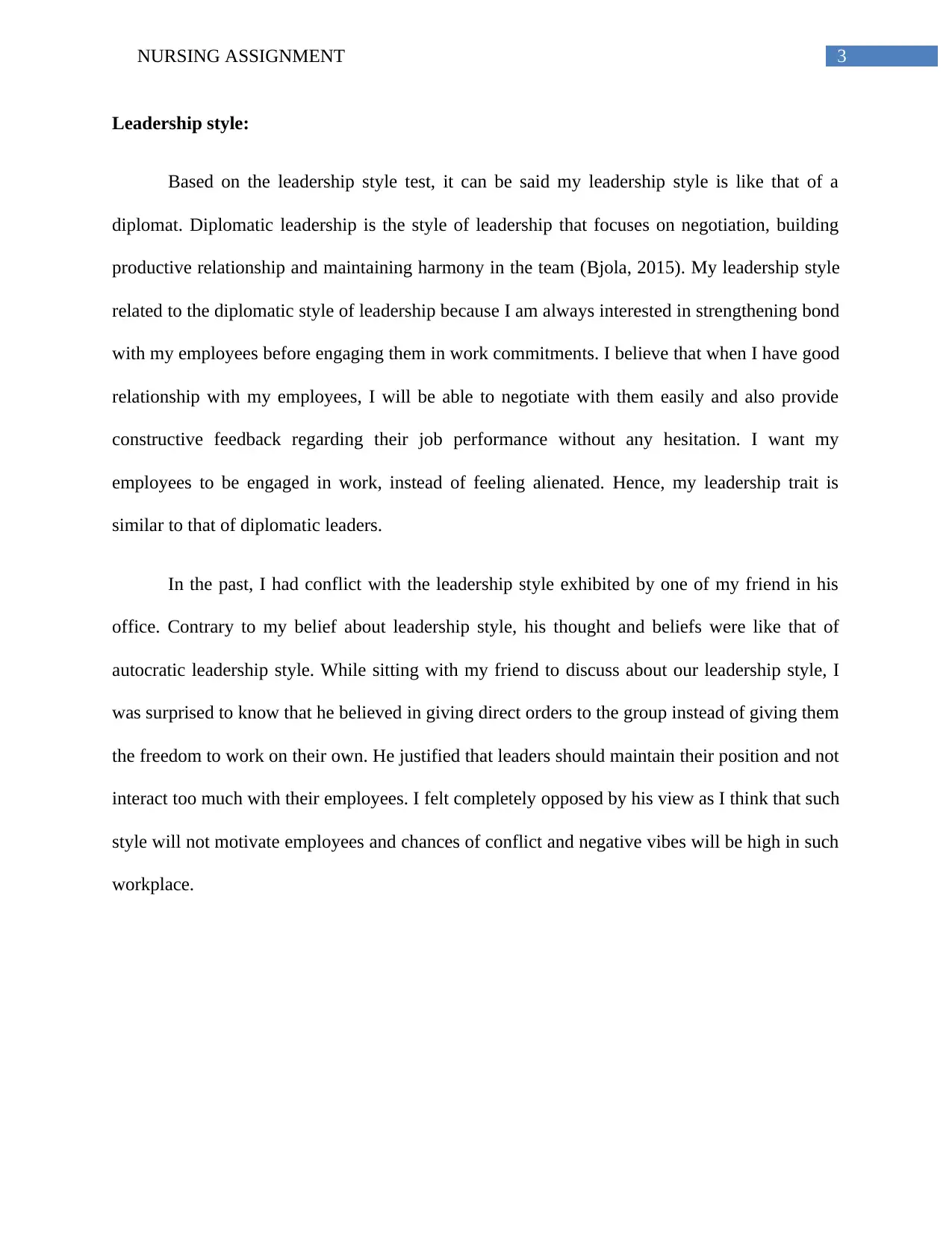
3NURSING ASSIGNMENT
Leadership style:
Based on the leadership style test, it can be said my leadership style is like that of a
diplomat. Diplomatic leadership is the style of leadership that focuses on negotiation, building
productive relationship and maintaining harmony in the team (Bjola, 2015). My leadership style
related to the diplomatic style of leadership because I am always interested in strengthening bond
with my employees before engaging them in work commitments. I believe that when I have good
relationship with my employees, I will be able to negotiate with them easily and also provide
constructive feedback regarding their job performance without any hesitation. I want my
employees to be engaged in work, instead of feeling alienated. Hence, my leadership trait is
similar to that of diplomatic leaders.
In the past, I had conflict with the leadership style exhibited by one of my friend in his
office. Contrary to my belief about leadership style, his thought and beliefs were like that of
autocratic leadership style. While sitting with my friend to discuss about our leadership style, I
was surprised to know that he believed in giving direct orders to the group instead of giving them
the freedom to work on their own. He justified that leaders should maintain their position and not
interact too much with their employees. I felt completely opposed by his view as I think that such
style will not motivate employees and chances of conflict and negative vibes will be high in such
workplace.
Leadership style:
Based on the leadership style test, it can be said my leadership style is like that of a
diplomat. Diplomatic leadership is the style of leadership that focuses on negotiation, building
productive relationship and maintaining harmony in the team (Bjola, 2015). My leadership style
related to the diplomatic style of leadership because I am always interested in strengthening bond
with my employees before engaging them in work commitments. I believe that when I have good
relationship with my employees, I will be able to negotiate with them easily and also provide
constructive feedback regarding their job performance without any hesitation. I want my
employees to be engaged in work, instead of feeling alienated. Hence, my leadership trait is
similar to that of diplomatic leaders.
In the past, I had conflict with the leadership style exhibited by one of my friend in his
office. Contrary to my belief about leadership style, his thought and beliefs were like that of
autocratic leadership style. While sitting with my friend to discuss about our leadership style, I
was surprised to know that he believed in giving direct orders to the group instead of giving them
the freedom to work on their own. He justified that leaders should maintain their position and not
interact too much with their employees. I felt completely opposed by his view as I think that such
style will not motivate employees and chances of conflict and negative vibes will be high in such
workplace.
Paraphrase This Document
Need a fresh take? Get an instant paraphrase of this document with our AI Paraphraser
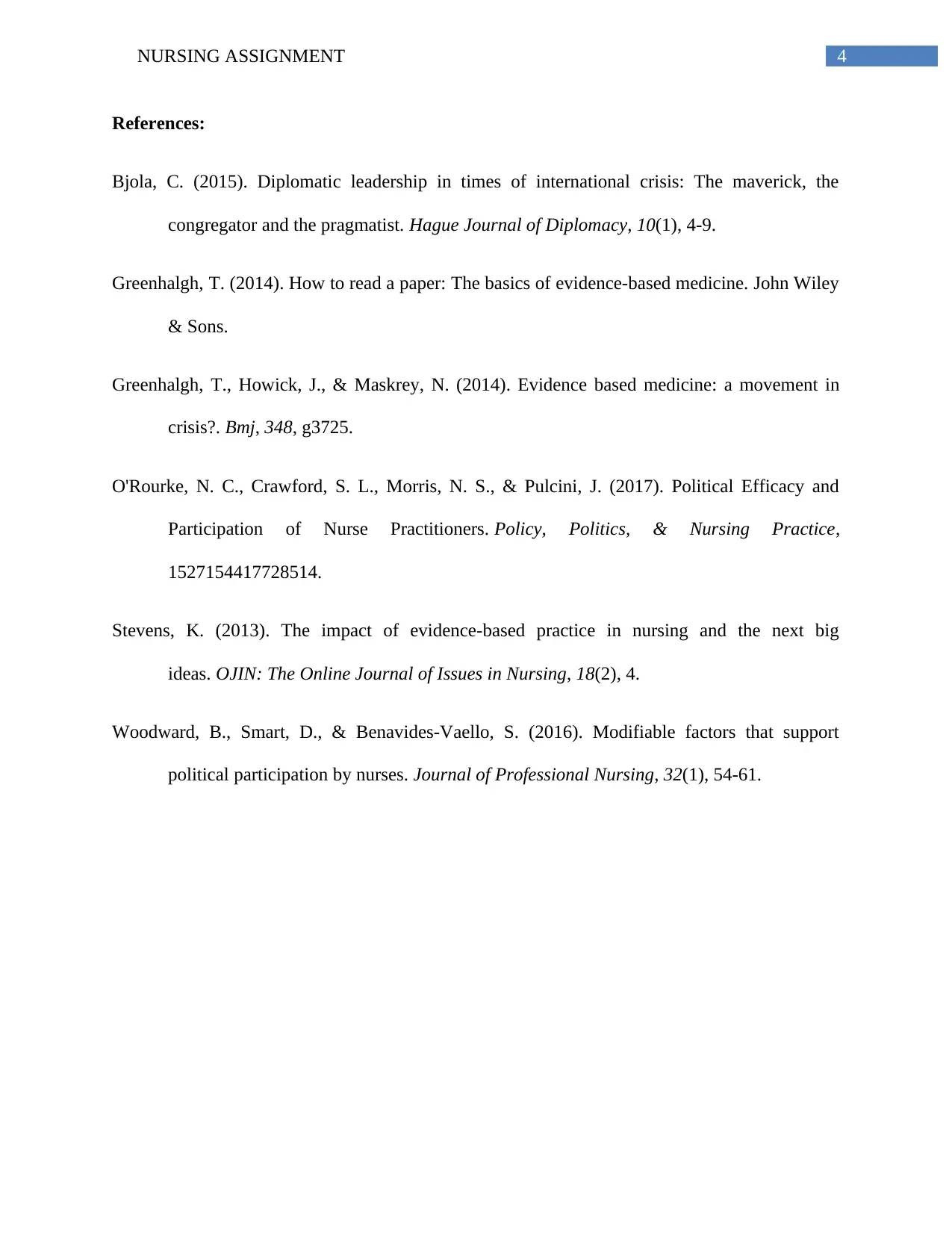
4NURSING ASSIGNMENT
References:
Bjola, C. (2015). Diplomatic leadership in times of international crisis: The maverick, the
congregator and the pragmatist. Hague Journal of Diplomacy, 10(1), 4-9.
Greenhalgh, T. (2014). How to read a paper: The basics of evidence-based medicine. John Wiley
& Sons.
Greenhalgh, T., Howick, J., & Maskrey, N. (2014). Evidence based medicine: a movement in
crisis?. Bmj, 348, g3725.
O'Rourke, N. C., Crawford, S. L., Morris, N. S., & Pulcini, J. (2017). Political Efficacy and
Participation of Nurse Practitioners. Policy, Politics, & Nursing Practice,
1527154417728514.
Stevens, K. (2013). The impact of evidence-based practice in nursing and the next big
ideas. OJIN: The Online Journal of Issues in Nursing, 18(2), 4.
Woodward, B., Smart, D., & Benavides-Vaello, S. (2016). Modifiable factors that support
political participation by nurses. Journal of Professional Nursing, 32(1), 54-61.
References:
Bjola, C. (2015). Diplomatic leadership in times of international crisis: The maverick, the
congregator and the pragmatist. Hague Journal of Diplomacy, 10(1), 4-9.
Greenhalgh, T. (2014). How to read a paper: The basics of evidence-based medicine. John Wiley
& Sons.
Greenhalgh, T., Howick, J., & Maskrey, N. (2014). Evidence based medicine: a movement in
crisis?. Bmj, 348, g3725.
O'Rourke, N. C., Crawford, S. L., Morris, N. S., & Pulcini, J. (2017). Political Efficacy and
Participation of Nurse Practitioners. Policy, Politics, & Nursing Practice,
1527154417728514.
Stevens, K. (2013). The impact of evidence-based practice in nursing and the next big
ideas. OJIN: The Online Journal of Issues in Nursing, 18(2), 4.
Woodward, B., Smart, D., & Benavides-Vaello, S. (2016). Modifiable factors that support
political participation by nurses. Journal of Professional Nursing, 32(1), 54-61.
1 out of 5
Related Documents
Your All-in-One AI-Powered Toolkit for Academic Success.
+13062052269
info@desklib.com
Available 24*7 on WhatsApp / Email
![[object Object]](/_next/static/media/star-bottom.7253800d.svg)
Unlock your academic potential
Copyright © 2020–2026 A2Z Services. All Rights Reserved. Developed and managed by ZUCOL.





